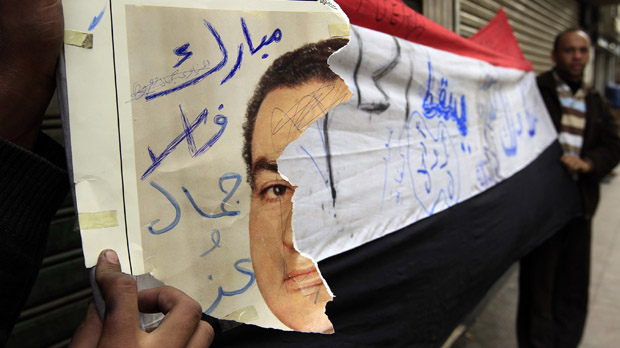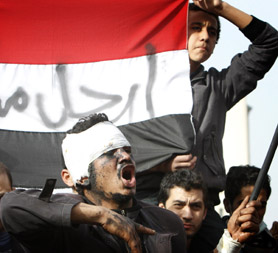Egypt protests: ‘dictators must know their limits’
On day six of Egypt’s anti-government protests, Middle East expert Dr Larbi Sadiki writes for Channel 4 News on the mistakes of the Mubarak regime which have led to the current chaos.

President Mubarak has but himself to blame for the wrath that has engulfed all of Egypt‘s big cities from Suez to Cairo. After nearly 30 years in power, his Egypt lags behind in democratisation and economic development and distributive justice within. Its international stature has been dented by the files of most relevance to its own national security from Palestine to Sudan.
Mubarak himself has not been in charge of Egypt for some time. The tragic loss of his grandson, 12-year-old Muhammad Alaa Mubarak in 2009, and ill-health have kept him away from running the country’s domestic politics. Mubarak is by any standards an important Arab statesman and a close ally to the US as well as to the EU. The biggest stamp of his reign has been stability.
Rightly or wrongly, he is blamed by many Egyptians and Arabs for the 23-day bombing of Gaza in 2008-09.
This stability he has attempted to implement on five important fronts. He has kept the formidable Muslim Brotherhood in check but without totally excluding it; he has stamped out as well as tamed extremist forces such as Al-Jamiah al-Islamiyyah or the Islamic Group, amongst others; he has been steadfast and skilful in observing a difficult peace with an intransigent Israel, a peace that has not percolated to Egyptian civil society; and he has continued to be a peace-broker in Palestinian-Palestinian as well as Palestinian-US-Israeli negotiations.
Egypt uprising: ‘the stakes could hardly be higher’
Probably no other dossier has caused more damage to Egypt’s stature in pan-Arab public opinion than the mishandling of this. Egypt has traditionally produced brilliant foreign ministers. Ahmed Abou El Gheit has to be the worst when compared to Amrou Moussa or Esmat Abd El-Meguid, amongst others. Rightly or wrongly, he is blamed by many Egyptians and Arabs for the 23-day bombing of Gaza in 2008-09, which Egypt could only passively watch, and for the division of Sudan, a country of historically strategic importance to Egypt.
The wrath expressed by millions of Egyptians boils down to almost personalised anger with Mubarak himself.
However, the wrath expressed by millions of Egyptians on Friday (28 Jan) boils down to almost personalised anger with Mubarak himself. It is his pictures, symbols of his authority, ranging from police stations to offices of his ruling NDP party, against which the bulk of the protesters’ anger was targeted. With swelling numbers into tens of thousands over a long and angry Friday, the burning, stoning, ripping and shouting of anti-regime slogans were akin to an open plebiscite that the one thing Egyptians do not want to rule over them any longer was Mubarak himself.

Wrong to assume deference by Egyptians
Indeed, a free and fair plebiscite [referendum] that neither the ruling NDP can falsify nor the machine of spin doctors – the stalwarts such as Ahmed Ezz, Safwat Sharif, Ali Eddin Helal, and Fethi Sorour – can hide from President Mubarak. They can only watch in dismay and awe that they were wrong when they assumed total deference and submission by Egyptians.
For, it is this cabal’s machinations that wagered, and obviously now lost, that rigging the November 2010 parliamentary elections was the route to securing NDP domination over further constitutional gerrymandering or paving the way for either a sixth term for Mubarak senior or his son Gamal, literally the country’s de facto president in domestic affairs.
That was an unpardonable blunder. The 420 seats, including independents who contested the country’s most openly and arrogantly rigged polls, gave the ruling party an unprecedented majority in the newly expanded 518-seat parliament. Mubarak senior knew his limits and devised mechanisms and safety-valves for political decompression.
The writing was on the wall from the moment the Muslim Brotherhood was robbed of its capacity to win a single seat in the 2010 elections.
He allowed the Muslim Brotherhood a margin of existence, knowing it was an important channel and forum for containing anti-regime anger. He allowed the press a degree of free expression that was completely absent in Ben Ali’s Tunisia. NGOs, even if partly harassed, were active. Kifaya, Egypt’s Movement for Change, staged so many demonstrations and sit-ins, which communicated messages to Mubarak.
Gamal Mubarak’s miscalculation
Gamal Mubarak and the sycophantic men, many of whom have a reputation for the kind of corruption Tunisia’s Trabelsi clan committed in Tunisia, gradually executed a coup in Mubarak senior’s life, changing the rules of political game.
They took away society’s safety-valves. The writing was on the wall from the moment the Muslim Brotherhood was robbed of its capacity to win a single seat in the 2010 elections. The Brotherhood could win more than the 88 seats its members secured despite rigging. They understood Mubarak senior’s game and exercised electoral self-constraint by fielding candidates in limited constituencies.
Gamal Mubarak might have been brought up in a political house. But in the 2010 elections he showed that he did not assimilate the most important lesson for his own political career: dictators can be good at politics only if they know their limits.
Dr Larbi Sadiki is a Senior Lecturer in Middle East Politics at the University of Exeter.